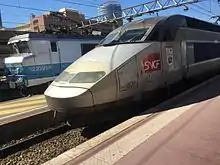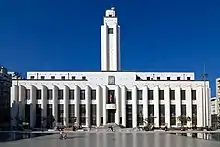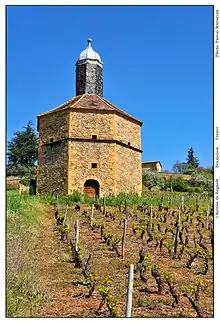Greater Lyon is the region that surrounds the city of Lyon in south-eastern France, consisting of the departments of Ain, Loire, and Rhône plus the Lyon Metropolis, a "territorial collectivity" (collectivité territoriale) with the same powers as a department. The whole area is in the larger Auvergne-Rhône-Alpes region.

Cities
- Ain
- Loire
- Rhône
- Villefranche-sur-Saône
- Lyon Metropolis
Other destinations
Understand
Ain
Ain is a department named after the Ain River on the eastern edge of France. Being part of the region Rhône-Alpes and bordered by the rivers Saône and Rhône, the department of Ain enjoys a privileged situation. It has an excellent transport network (TGV, highways) and benefits from the proximity to the international airports of Lyon and Geneva.
Ain is composed of four geographically different areas (Bresse, Dombes, Bugey and Pays de Gex) which – each with its own characteristics – contribute to the diversity and the dynamic economic development of the department. In the Bresse agriculture and agro-industry are dominated by the cultivation of cereals, cattle breeding, milk and cheese production as well as poultry farming. In the Dombes, pisciculture assumes greater importance as does viticulture in the Bugey. The high diversification of the department's industry is accompanied by a strong presence of the plastics sector in and around Oyonnax (so-called "Plastics Valley").
Due to its industrial character and a close-meshed tissue of small and medium enterprises, Ain ranks among the departments with the fastest growing economy in the country. Its unemployment rate lies far beneath the national and regional average. Besides the export-oriented SME's, several large enterprises with a leading position on national and international markets have settled in the department.
Although looking toward the future, Ain nevertheless attaches great importance to its historical and cultural heritage, as illustrated by its cuisine (restaurant of Georges Blanc in Vonnas), its annual poultry competitions in the Bresse ("the three glorious") and its tourism (346 classified monuments such as the famous church of Brou in Bourg-en-Bresse, 14 museums of France, eco-tourism and ski tourism).
Rhône
The Rhône department encompasses varied landscapes and can be divided into three major parts:
- The Beaujolais hills in the north.
- The Lyonnais hills in the west.
- The mountains of Pilat in the south.
The department Rhône-Loire was created in 1789, but was split in two in 1793. In 2015, Lyon and its immediate area were separated from the Rhône department.
The Rhône department now has about 470,000 inhabitants.
Lyon Metropolis
The Lyon Metropolis, known in French as Métropole de Lyon (official) and Grand Lyon (unofficial), is the newest of France's department-level units.
Talk
The language in the Rhône is of course French, but beware that Lyon has a famous drawl and singing and vocabulary idiosyncrasies: the sound "eu" would be added at the end of each word and pronounced addition of more closed in the rest of France.
Some particular Lyonnais words
- "gone": child
- "fenotte": woman
- "ficelle": funicular
- "vogue": fair
- "cagnard": sun
- "allée": building entrance
- "bouchon": restaurant
Get in

See the Lyon article for more information on getting to the main city in the region.
By plane
Lyon's Saint-Exupéry Airport, some 25 km east of Lyon, is a rapidly developing airport. It still hosts few intercontinental flights (Dubai, North Africa...), but can easily be reached via a European hub (Paris, London, Frankfurt...). Air France serves most airports in France and major European airports. EasyJet serves a number of destinations in Europe, including London, Berlin, Brussels, Rome, Edinburgh and Madrid, along with a few domestic destinations which are not easily reached by train (Bordeaux, Toulouse, Nice). Most other major European airlines also operate flights between Lyon and their respective hubs.
Grenoble airport (GNB IATA) is actually about midway between Lyon and Grenoble and is served by some low-cost airlines. There are bus services to Lyon from there.
Another possibility is to fly to Geneva (GVA IATA), which can save you money if you use low-cost airlines. Then Lyon can be reached by train, but it takes about two hours (€21.50 for under 26s).
Finally, an interesting option for intercontinental visitors may be to fly to Paris Charles de Gaulle airport (CDG) and take a TGV (high-speed train) to Lyon Part-Dieu station directly from the CDG train station. In some cases, this makes the journey faster and more convenient (no need to go from LYS to the city). Trains run every hour or so; be sure to buy an exchangeable ticket to be able to catch the first available train after you land.
By train
From the rest of France, train is generally the most convenient way to reach the region.
Lyon is linked by TGV (fast trains) to Paris (two hours) and Marseille (1 hr 36 min). Many other domestic destinations are served directly, and there are several direct services to Brussels every day (4 hr). Other international destinations include Barcelona, Frankfurt, Basel and Geneva. As a general rule, TGVs to and from Paris serve both Perrache and Part-Dieu stations; other TGVs generally serve only Part-Dieu.
Coming to Lyon from London by Eurostar may be interesting, and there are now direct trains from St Pancras International to Part-Dieu several times a week, with a journey time of 4hr 41 mins.
By bus
International bus services are operated by most major companies such as Eurolines, Starshipper, Ouibus, Flixbus... and serve most major European cities. Buses usually stop at the Lyon Perrache bus station.
By car
Lyon is a major automotive hub for central and southern France:
By bike
You can access Lyon by bike using the ViaRhôna route, a 750km bike path linking Geneva to the Mediterranean coast along the Rhône river.
Get around
Traffic can be heavy on the outskirts of Lyon.
See

For winelovers
- la maison du terroir beaujolais, Place de l'Hôtel de ville, 69430 Beaujeu. Mar-Dec: M-F 10:00 – 12:30, 14:00 – 18:00; Su holidays 10:00 – 12:30, 15:00 – 18:00. Visitor centre and tasting room €7.
- 🌍 Espace Pierres Folles (Crazy stones space), St-Jean-des-Vignes. Geological and viticultural museum and botanic garden.
- La Maison Des Beaujolais, 441 Avenue de l'Europe, 69220 Saint-Jean-d'Ardières, France. Wine tasting and restaurant. €7.90 for 1-hour tasting.
Lyon
See detailed article on Lyon.
The city of Lyon, with its exceptional historical site listed as Unesco World Heritage (one of the largest spaces with Bordeaux):
- The Basilica of Notre-Dame de Fourvière
- 'The Gallo-Roman theaters (Odeon and Grand Theatre)
- Cathedral of St. John , seat of the Primate of the Gauls.
- The medieval and Renaissance district of Old Lyon' (cobbled streets and beautiful alleyways with)
- The Lyon City Hall and the Palais Saint-Pierre (Museum of Fine Arts) looks over the most beautiful town square.
- The National Opera.
- The Hotel-Dieu
- Place Bellecour, the largest square and heart of the city with its center the equestrian statue of Louis XIV.
- The numerous beautiful churches in all styles (Romanesque, Gothic, Gothic, Renaissance, baroque, classical, neoclassical, ...) (Lyon is one of the earliest centers of Christianity): St Nizier Church, St Paul, St Just, St Bruno des Chartreux, St. Polycarp, St. Martin d'Ainay, Pothin St, St Georges; Chapels of the Hotel-Dieu, St Thomas (Chapel of Our Lady of Fourvière), Trinidad particular.
Museums and monuments of the Rhone

- 'Roman aqueduct of Gier - Chaponost The longest aqueduct section of France.
- The golden villages: Oingt in particular.
- The Notre-Dame des Marais, the old district of Villefranche-sur-Saône.
- Gallo-Roman Museum in St-Romain-en-Gal St-Romain-en-Gal One of the largest archaeological sites in the Gallo-Roman period in France.
- Hôtel Dieu - 68 Republic Street, Belleville-sur-Saône Guided tours only. The Hôtel Dieu hospital presents history in the eighteenth century (surgical instruments, apothecary).
- Castle of Corcelles - Corcelles-en-Beaujolais| Free visit M-Sa 10:00 - 12:00 and 14:00 - 18:30. Fortified castle of 13th-15th centuries.
Do
Hiking The Rhône offers a multitude of opportunities for hiking, walking, cycling, mountain biking and horse riding.
- Beaujolais: circuits in the heart of the vineyards, through the villages of the region of the Golden stones or on the hills of the Monts du Beaujolais, including:
- the circuit peaks : golf 40 km through the Beaujolais wine
- the Green Route : footpath of 11 km of Belleville-sur-Saône in Beaujeu, connected to loops of cycling and discovery; accessible on foot, by bike, mountain biking, skating and the disabled.
- Hills and mountains of Lyonnais: trails through mountains and hills, orchards, along the Roman aqueducts or top of the line of peaks (Col de la Luère - St-Martin-en-Haut).
- Lyon and surroundings: possibilities of urban hiking in between hills and along the shores, in peri-urban parks (Miribel-Jonage, Lyon connected by a bike path; Lacroix-Laval) or in the Monts d'Or.
- Pilat: hiking in the heart of the Pilat Regional Natural Park, through the vineyards of the Côtes du Rhone or along the Rhone
Eat
Lyon has been described as the world capital of gastronomy. There are many authentic "bouchons" (typical Lyonnais restaurants).
Drink

The Rhône is well known for its wines. The department has three viticultural areas:
- Beaujolais to the north. Known for Beaujolais Nouveau, its wines are less so: Brouilly, Chénas, Chiroubles, Côte de Brouilly, Fleurie, Julienas, Morgon, Moulin à Vent, Régnié and Saint Amour.
- Côtes du Rhône two wines are in the department: Côte Rôtie and Condrieu.
- Coteaux du Lyonnais vineyards from the west Lyons.
Stay safe
Go next
Neighbouring regions:
- Isère, Savoie and Haute-Savoie to the east
- Auvergne to the west
- Ardèche and Drôme to the south
- Bourgogne-Franche-Comté to the north
Cross-border:
- Geneva in Switzerland